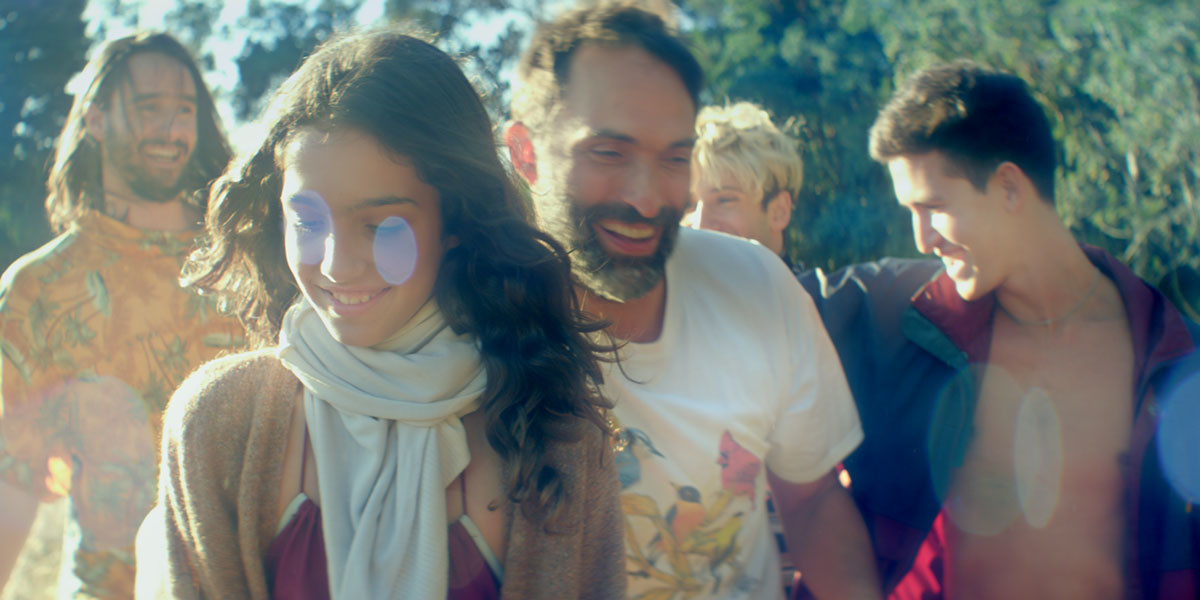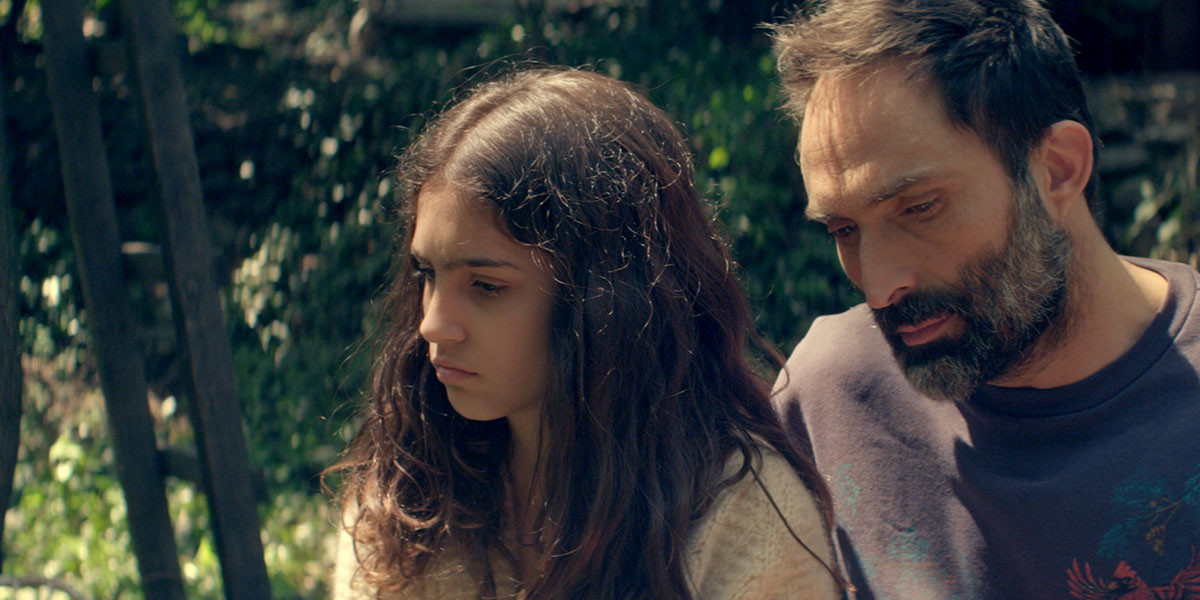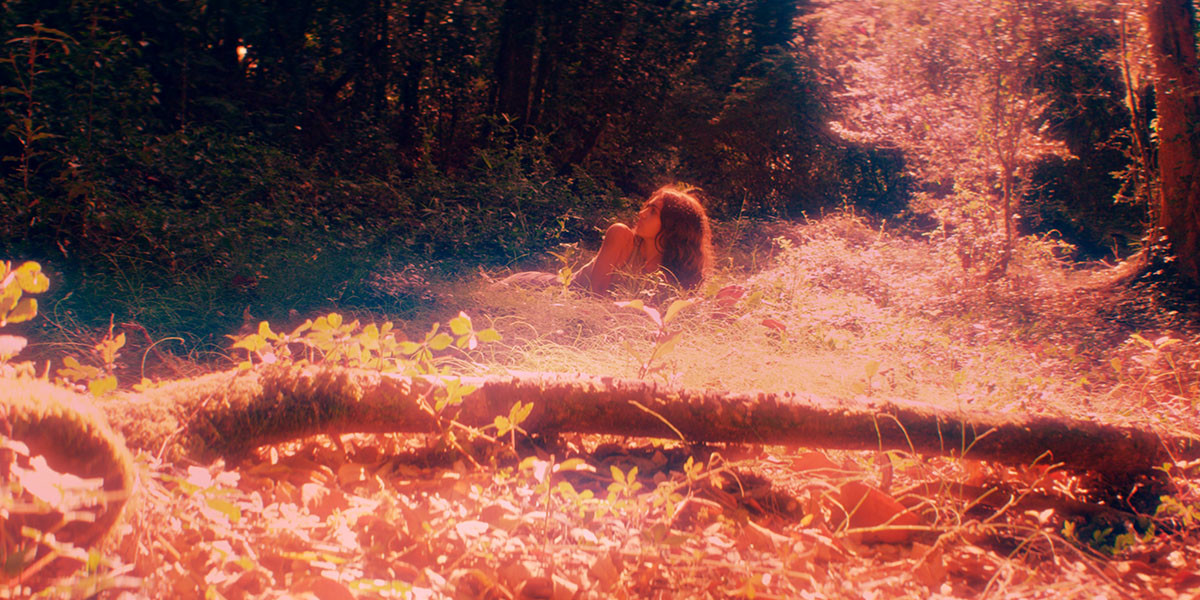Despite constant grumblings about budget cuts and diminished programs, the various sections of the Toronto International Film Festival (TIFF) this year were great for new works by young female directors. I was anxious to see Marialy Rivas’ Princesita, a woozy deep dive into the mindset of a teenage girl named Clara (Sara Caballero) who slowly comes to realize her family of fellow kids (living in the woods, lorded over by a perpetually smiling middle-aged man named Miguel, played by Marcelo Alonso) is actually a cult. Clara is expected to deliver Miguel a son in due time; until then she attends a regular school and passes herself off as a normal person. Her coming of age is paralleled with the realization that her body effectively belongs to Miguel, while Rivas stitches everything together in a music-video-like lush slow motion with competing, psychologically penetrating voice-over narrations.
While Caballero’s performance is tremendous, I personally wanted the film to push its insinuations a few steps further: it’s immediately obvious that Clara is a stand-in for restricted womanhood at large. By keeping things walled off within the realm of fantasy, Rivas misses a great opportunity to make more detailed critiques of Chilean society today. But the film weaves its own spell nevertheless, and I enjoyed the opportunity to talk with Rivas about her thoughts on women’s rights and which types of stories are getting better represented in Latin American cinema today.
On returning to TIFF as a filmmaker who participated in its labs
Toronto is a huge festival – it’s big. It has very high profile movies. So of course you’re torn between that and a small familiar feeling. It’s mixed because I already know a lot of filmmakers – the good thing is you meet other filmmakers, you’re interested in their work, they’re interested in yours, you keep meeting a lot of people… So yeah, it’s always like that.
On finding, and cultivating, a relationship with Sara Caballero
When we did the casting, we don’t have an industry for child actors in Chile, like in the States. We just went to schools and we cast kids with their parents’ consent… So that was the first part. I saw this kid Sara, she had something inside her… She had a pain inside her, in a way.
When Clara crosses the river, even though I had a body double for the whole film and it’s the double who swims… it was cold. Sara needed to jump in the water in order to get a shot, where she’s coming out. She was super scared – she’s a child, I told her “If you don’t wanna do it, don’t do it. I wouldn’t be able to do it, maybe we can shoot it another day.” And she goes, “No! I’m gonna do it!” Putting your head in cold water, it’s always a shock. Later she told me, “Thank you for making me more brave.”

On the background for this fairy tale narrative
I had read a story about a girl who had been forced by her grandfather to carry a baby; it was in 2012. This guy had a cult, and he believed she would bring the savior of the world. I read that story and I thought, “Wow. They don’t care what this girl wants – just how she serves them.” And that makes me wonder, how is female identity constructed and built? Women are always expected to behave in certain ways, in regards to male society. Not that all men are bad – but society is structured in this way so men can do things regarding the power dynamic. This is how I started to think about the story. It was more for me to represent women: how do we find ourselves under this toxic masculinity, always? It can be more intense, or less extreme…
Chile only just passed a law allowing abortions for women who have been raped, or who are gonna die. This didn’t even exist 10 days ago. I live in a society that is modern, but it’s not. Because women are seen as less, so they can’t decide about their own bodies. And it’s insane. The law is still in the process of passing, and they even add a part that says, if a doctor don’t wanna do the abortion because of his conscience, he can say no. They also added a thing that says, if you’re under 14, you need your parents to approve – c’mon, 86% of these teenagers are being raped by that adult. Because they believe that women will lie and say they’ve been raped. How badly do you need to think of women to believe that? So there is a layer of metaphor for every woman, in a sense – not every woman passes through this kind of abuse that is super harsh. Chile hates their women, and they tell me I’m extreme. Are you kidding me? I have friends who have had to wait until the baby has died inside. It’s psychologically tremendous. They have been abused by the Chilean state. It doesn’t make sense. Another woman almost died because her baby had problems and she couldn’t get an abortion. So while I was making Princesita, this was the society I was living in.

On telling counter-institutional narratives in Chile
Yes, and no, because the only money we get for these types of films is government money, and they only give six grants a year. And then they only give you $250,000 and you have to do everything under that amount. Because I worked with Pablo and Juan [Larraín], they got Setembro, which is from Spain, to invest. At the same time, Spanish-language movies are hard to sell, especially if they are dark and artsy like this one! [laughs] Europe is important, they provide money to Latin American productions – but then again and again, they have a type of cinema they expect us to make. So…. You need to do that type of cinema or maybe you won’t get the money.
On European (or United States) money in helping get these stories off the ground
To be perfectly honest, I would prefer to shoot in English, in the States; they have an industry. Nothing is easier; it’s always hard to get money. I used to joke around when we were shooting that making movies is like being in a cult! You have this director with an idea, it’s not concrete, it will probably go more wrong than good! Everything is complicated. Then you have all these people following you and saying “Yes! Yes! Yes! We believe in this idea!” It’s a temporary insanity.

On other contemporary filmmakers she admires
I love Mayse Alberti’s work and I have a seen a lot of female-directed movies like Raw, or a film about a woman who fell in love with a wolf. When I see daring voices pushing margins, I love it. I saw the new Amat Escalante – The Untamed. For me that’s fascinating – you are pushing the storytelling because you sit there as an audience, and you don’t know what’s gonna happen. I love that risk.
On continuing to work in a fairy tale vein
I will see what is good for that story. In terms of cinematographic tools you can use, the story gives you the shape. The essence of the movie reflects in a type of narrative shape. For this that’s what made the best possible movie. I don’t think you can apply a formula to every story.







